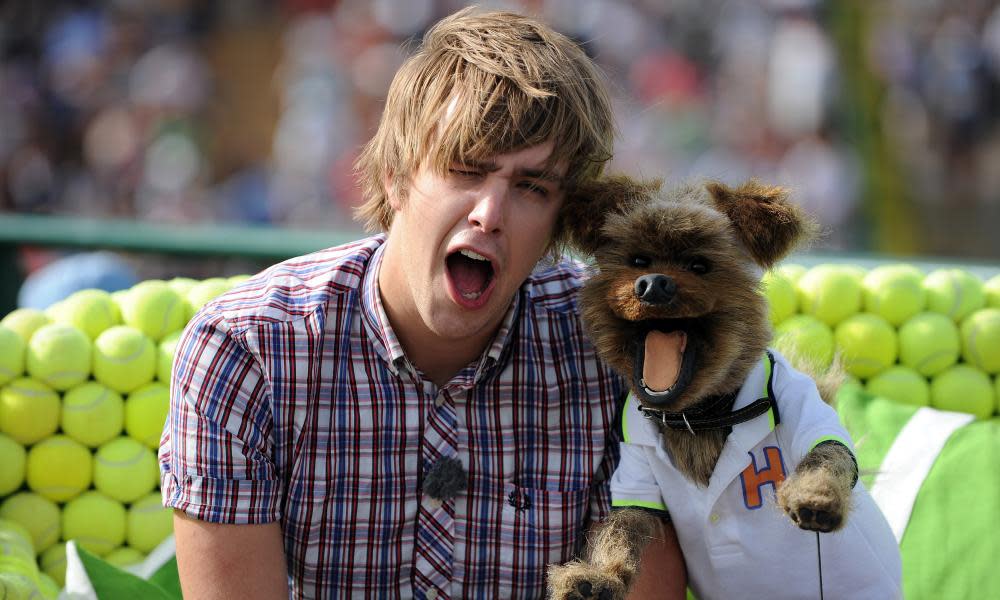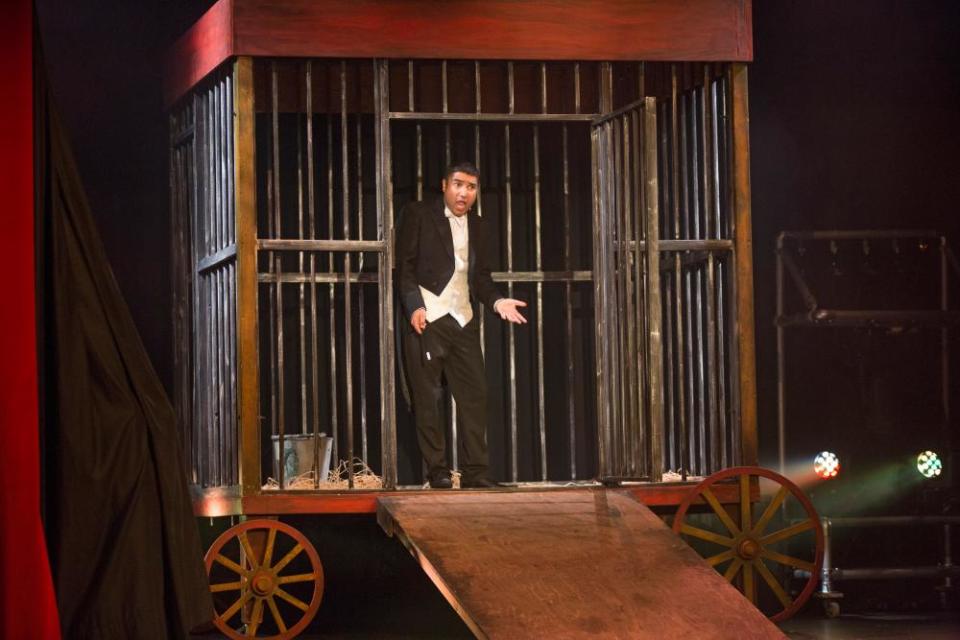'Kids can smell fear': the standups who took over children's TV

What do standup comics do in the daytime? A glance at television schedules provides an answer: many hone their craft in the gaily coloured landscape of children’s comedy. The casts of some of these shows could fill an A-list festival for weeks. David Baddiel, Adam Riches and Meera Syal are among the comic performers on the long-running Horrible Histories, while James Acaster, Susan Calman, Romesh Ranganathan, Katherine Ryan and Phil Wang have all been contestants on the panel show The Dog Ate My Homework. The calibre of comedy is so high that there’s never a temptation to shout: don’t give up the night job!
The presenter of the first six series of The Dog Ate My Homework was Iain Stirling, whose career began with a superhero-style division of labour. By day, he presented links between programmes on CBBC, with Hacker the dog as his sidekick; by night, he was on the standup circuit when his most devoted fans were tucked up in bed. “I was in my 20s,” he says, “and I sometimes felt like being a kids’ TV presenter made me less legitimate. You’re thinking, ‘I’m gonna be Bill Hicks and I’m gonna be Bill Hicks tomorrow!’ The next thing you know, you’re four years into presenting children’s television with a puppet dog and there’s a bit of you that goes, ‘I don’t really know how this happened.’”
It was only when he began headlining The Dog Ate My Homework, in 2014, that he fully made peace with a younger demographic. “First of all, the show did well and got award nominations. That shouldn’t matter, but it gave me a sense of validity, that what we were making was good.” Children are the captains of the show’s two competing teams, with the adults beside them, including Stirling, riffing on the youngsters’ often hilariously bizarre answers. How is it different to performing exclusively with adults? “On a grownup panel show, you’re worried about interrupting someone’s train of thought, whereas kids haven’t necessarily got a plan when they start speaking, so anything you say only nudges them in a certain direction. A kid’s not going to go, ‘Oi, Iain, when you jumped in there it ruined the call-back I was going to do!’”

Scripted children’s comedy has also been thriving in recent years, with awards and acclaim for shows such as Class Dismissed, So Awkward and Hank Zipzer, based on the books co-written by Henry Winkler, AKA The Fonz, who also stars in the series. Nick Mohammed – better known to adult audiences as the magician Mr Swallow and from sitcoms such as Stath Lets Flats and the recent Intelligence – plays a headmaster on Hank Zipzer. “If anything, I’ve tried to push the character so it doesn’t feel patronising,” he says. “Obviously, there are limits in terms of tone. But I’m playing a mean headmaster, so I went as far as I could without it feeling abusive.”
Young audiences respond instantly: they won’t sit and think about a joke or allow it to grow
Nick Mohammed
Mohammed was also a regular on the CBBC sketch series Sorry, I’ve Got No Head. “That never struck me as a children’s show. Many of the sketches weren’t dissimilar to something like Little Britain, apart from the absence of innuendo and bad language. Part of the writers’ ethos was not to write for children, just to write characters and ideas that were funny.” Are there any substantive differences between what children and adults are tickled by? Mohammed mulls this over. “A seven-year-old wouldn’t laugh at David Brent,” he decides. “But they’d probably find his dance funny.”
If it’s true that we need to have known a lifetime’s disappointment, or at least a few dead-end jobs, to appreciate The Office, then perhaps the essence of children’s comedy lies in its immediacy and the ability to savour it without additional context. “Clarity, as well as cutting to the joke, are important,” says Mohammed. “Young audiences respond instantly: they won’t sit and think about a joke or allow it to grow.”
Stirling agrees. “A child’s sense of humour is more primal and instinctive,” he says. “Adults like either to be tricked – the ‘pull back and reveal’ – or that Radio 4-type thing of, ‘I’ve said this but we all know what I really mean is this.’ Kids are more like, ‘I want to see someone fall over when I don’t expect it.’”
That directness is why comics with experience on both sides of the watershed often dread bombing in front of children far more than they do with an adult crowd. Ellie White, another Stath Lets Flats cast member as well as one half of a sketch duo with Natasia Demetriou, sounds almost fearful when I ask about working with the young cast of Class Dismissed. “Doing stupid characters in front of a bunch of 13-year-olds is intimidating,” she says. “If I made one of them laugh, I’d feel that I’d cracked it. Usually they were so stony-faced, you could see them thinking, ‘You’re a complete prat.’ Kids can smell try-hard. They can smell fear. They’ll sit there, arms folded, going, ‘Yeah and what else have you got?’”
Stirling gives a little shudder at the thought of dying in front of a school-age audience. “A death in front of adults isn’t because they hate you,” he points out. “It’s because it’s awkward. ‘Oh God, I feel terrible for this person.’ Dying in front of children is different. They don’t care. They’re more like, ‘When this gets funny we will absolutely get on board, but at the minute it’s horrific.’”
Inel Tomlinson entered children’s comedy from its grownup branch with an advantage over his contemporaries: he and Johnny Cochrane, stars of The Johnny and Inel Show on CBBC, were formerly secondary-school teachers. “We approached it how we would’ve approached planning lessons,” he tells me. “You have to make every lesson accessible to a range of abilities. We put stuff in the show that younger kids would get as well as things for teenagers and parents. The key is to pitch upwards: never talk down.” One sketch featured fairytale characters airing their grievances on a Jeremy Kyle–esque TV show. “Young viewers enjoyed seeing familiar characters bickering, and teenagers understood the jokes about Little Red Riding Hood’s grandmother taking a DNA test to see if she was really the wolf.”
It was vital for Tomlinson that the humour had a positive philosophy behind it. “We were very aware that we were two black boys and that was something many kids were seeing for the first time. You don’t get guys like us fronting children’s TV, let alone people from working-class, innercity backgrounds. We wanted to deliver a certain kind of humour and to show that it could be inclusive. None of our characters were wayward; they weren’t troublemakers.” He cites as an example: Rudy and Boyyer, who worked in a supermarket. “We made them rude boys who still really love their jobs and have high moral standards. ‘Excuse me, madam, you’ve only got three items there, so you don’t need no plastic bag, yeah?’ Then they’d give the customer a lecture about how plastic damages the environment.”
Ellie White believes children’s comedy brings its own unique freedoms. “There’s a silliness you can embrace, which there isn’t as much room for in sitcomland,” she says. “There isn’t the same judgment attached to it, whereas on an adult show, it’s more like ‘grow up’ or ‘be a bit cleverer.’” But Mohammed thinks there is still some snobbery or suspiciousness. “There is the view, which I don’t agree with, that children’s comedy is a lesser form. Grownup comedy often feels it’s pushing boundaries, going where other art forms might not tread. The nature of that means it can be quite dark, which you can’t really do for children. It would be very strange to create a super-alternative cult children’s comedy, wouldn’t it? Children’s comedy needs to be mainstream to a degree. You don’t get the clear distinctions in tone and sensibility that you find between, say, Channel 4 adult comedy programming and its BBC One equivalent.”
For Stirling, there remains something pure about the comedy he’s done for children. “When The Dog Ate My Homework started, I’d watch it alongside other stuff I’d done and I’d be much happier with the person I was on kids’ television: I was more rounded there, with a clearer comedic voice. When you remove shock and vulgarity from your arsenal, it drives you to be your most essential self. You have to be nothing other than funny.”


